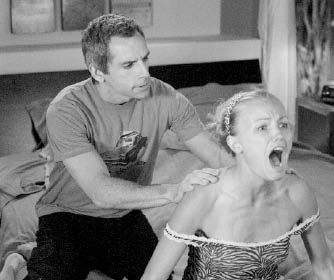Second Time Unlucky: The Heartbreak Kid
by M. Faust

Why do they bother remaking classic films for audiences who won’t remember them? I’ll bet that the bulk of the demographic for Ben Stiller movies will have no idea that The Heartbreak Kid is based on one of the great American comedies of the 1970s—and if they are, they probably won’t have seen it. (The DVD has been out of print for a few years.)
Both films share the same premise: a man gets married to a woman he hasn’t known very long. On their honeymoon, he meets a woman he likes better, and spends the bulk of the trip lying to his new bride so that he can get away to spend time with his new amour. After a few days he tells his wife he wants a divorce and pursues the woman he hopes will be her successor back to her home, where her family is less than happy to see him.
There are a few words you can’t avoid in describing the 1972 film: “Jewish” and “Graduate” chief among them. Adapted from a Bruce Jay Friedman story by Neil Simon (though it’s not typical of his usual polished style), the movie wears its Jewishness on its sleeve: When Cybill Shepherd appears as the other woman, few viewers won’t be thinking to themselves, “Shiksa!” Directed by Elaine May, the movie is also filled with similarities to The Graduate, directed five years earlier by her former comedy partner Mike Nichols.
The other inevitable word is “uncomfortable.” If you like movies where you can develop a nice cozy self-identification with the main characters, this is not the film for you. In his first starring role, Charles Grodin is brilliant as Lenny, a guy whose indefensible behavior flies in the face of our inclination to sympathize with him. Sure, his wife (an Oscar-nominated performance by Jeannie Berlin, May’s daughter) eats with her mouth open, sings loudly and off-key and can safely be described as emotionally needy. Still, she doesn’t deserve the treatment she gets. We don’t blame Lenny for lusting after Cybill Shepherd, but we can’t excuse him acting on his impulse. And that’s the tension that fuels the film’s humor: We laugh harder because we feel like we shouldn’t be laughing at all.
Forgive me for spending so much time telling you about the earlier movie, but it’s just so much more interesting than this new version, which is exactly what you would expect from a Ben Stiller movie made by the Farrelly Brothers (Dumb and Dumber, There’s Something About Mary, Shallow Hal, etc.) Our hero is re-christened “Eddie,” so that’s he’s not quite so Jewish. He’s given a backstory, a best friend and an overbearing dad (Ben’s real life father Jerry Stiller, and what’s that old axiom about certain traits skipping a generation?). The purpose of this expansion is to make him more conventionally sympathetic, to take the rough edges off him.
Similarly, Eddie’s wife Lila (Malin Akerman in a game performance) is a seemingly innocent, upstanding young woman who after marriage turns out to be an insatiable slut with a history of drug abuse. And the woman he leaves her for (Michelle Monaghan) is not a vacuous flirt who will be every bit as bad a wife, but a wholesome All-American girl who truly is his soulmate.
In other words, everything that May and Simon used to make us uncomfortable has been smoothed out. We’re left with a standard comedy of Ben Stiller being put into embarrassing situations, which he makes worse by lying his way through them. What the Farrellys inevitably add is an assortment of the gleefully coarse scenes they’re famous for. (The honeymoon location is moved from Miami to Mexico, so it’s only a matter of time before a donkey shows up.)
I’ll admit that I’m not a big fan of the Farrellys. It’s not that I object to raunchy humor; I just don’t think they’re very good at it. They don’t use coarse and uncomfortable situations as a basis for wit but as a substitute for it. A good dirty joke is funny because it throws you off guard, not because it’s simply dirty. Unless of course you’re 12 years old.
There are things the Farrellys are very good at, like the ways they use everyday people. (If the people playing Monaghan’s family are actors, they do a terrific job at not seeming actorly. And if they’re not actors, the Farrellys are adept at making them look at home onscreen. Either way it’s an accomplishment.) If they ever decide to make movies for grown-ups instead of 12-year-olds, I hold out hope for them.
|
Issue Navigation> Issue Index > v6n40: Failed State Diary (10/4/07) > Second Time Unlucky: The Heartbreak Kid This Week's Issue • Artvoice Daily • Artvoice TV • Events Calendar • Classifieds |









 Current Issue
Current Issue